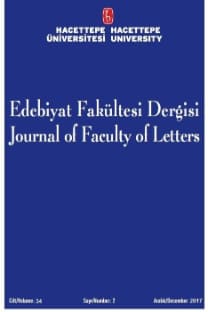Prens Kuza'dan Prens Karl'a: 1866 Romanya Krizi Karşısında Rusya ve Osmanlı İmparatorluğu
From Prince Cuza to Prince Karl: Russia and the Ottoman Empire In the Face of Rumanian Crisis of 1866
___
- Başbakanlık Osmanlı Arşivi (BOA) (İstanbul) Hâriciye Siyâsi (HR.SYS.) 1043/1, 1044/1 İrâde Hâriciye (İ.HR.) 218/12642, 220/12758, 223/13014, 223/13026
- Arhiv Vneşney Politiki Rossiyskoy İmperii (AVPRİ) (Moskova) Fond 133, opis 469 delo 48, 49
- Gosudarstvenniy Arhiv Rossiyskoy Federatsii (GARF) (Moskova) Fond 828, opis 1, delo 1435, 1436, 1437, 1438, 1439, 1440.
- The National Archives (NA) (Londra) Foreign Office (FO)
- The National Archives (NA) (Londra) Foreign Office (FO) 78 Turkey 1861, 1862, 1867, 1910,1912, 1915, 1916, 1921, 1922 65 Russia 698, 699, 700 881 Confidential Papers 1487, 1530
- Archives des affaires étrangères (AAE), (Paris) Correspondances Politiques (CP) Turquie, 366, 367, 368,
- Barker, Nancy Nichols (1964). "Austria, France and the Venetian Question 1861-1866", The Journal of Modern History, 2 (36), ss.145-154.
- Bobango, Gerald J. (1979). The Emergence of the Roumanian National State, Boulder: Columbia University.
- Berindei, Dan (1998). "The Nineteenth Century", Romania: A Historic Perspective, ed. Dinu C. Giurescu-Stephen Fischer-Galati, Boulder: Columbia University, ss.201-234.
- Bossy, R.V. (1938). L'Autriche et les Principautés-Unies, Bükreş: Imprimeries de l'État Imprimerie Nationale.
- Clark, Chester W. (1942)."Prince Gorchakov and the Black Sea Question, 1866 A Russian Bomb that did not Explode", The American Historical Review, 48.1, ss.52-60.
- Çertan, E.E. (1985). "Vneşnyaya politika Rumınii v 1862-1875 gg.", Oçerki Politiçeskoy İstorii Rumınii (1859), Kişinev: Akademiya nauk Moldavskoy SSR, ss.27-47.
- De Testa, Baron I. (1882). Recueil des Traités de la Porte Ottomane avec Les Puissances étrangeres, tom V, Paris.
- Grosul V.Ya.-E.E.Çertan (1969). Rossiya i Formirovaniye Ruminskogo nezavisimogo gosudarstva, Moskova: Nauka.
- Henry, Paul (1930). L'Abdication du prince Cuza et l'avènement de la dynastie de Hohenzollern au trône de Roumanie. Documents diplomatique, Paris: Librairie Felix Alcan.
- Hilke, Gerhard (1992). Rußlands Haltung zur rumänischen Frage 1864-1866, Südost-Forschungen 51, ss. 219-257.
- Hitchins, Keit (1994). Rumania 1866-1947, Oxford: Clarendon Press.
- Ignatyev, Nikolay Pavloviç (1916). Zapiski Grafa N.P.İgnatyeva, Petrograd: Tipografiya V.F.Kirşbauma.
- Iorga, N. (1938). Correspondance Diplomatique Roumaine sous le Roi Charles I-er (1866-1880), (Deuxiéme edition), Bükreş: Bibliothèque de l'institut pour l'étude de l'histoire Universelle.
- Iorga, N. (1945). Historie des Roumains et de la Romanité Oriental, Les Réalisateurs de l'Unité Nationale, vol.X, Bükreş: L'Académie Roumanie.
- Jelavich, Barbara. (2004) Russia and the Formation of the Romanian National State 1821-1878, Cambridge: Cambridge University.
- Kellogg, Frederick (1995). The Road to Romanian Independence, Indiana: Purdue University.
- La Question Dynastique en Roumanie, Paris: Librairie Achille Heymann, 1889
- Lascaris, S.Th. (1926). "La Première Alliance entre la Grèce et la Serbie, Le Traité d'Alliance de Voeslau du 14-26 Aout 1867", Le Monde Slave, 9, ss.3-50.
- Merinescu, Beatrice (1983). Romanian-British Political Relations 1848-1877, Bükreş: Bibliotheca Historica Romaniae Studies.
- Mosse, W.E. (1960). "England, Russia and the Roumanian Revolution of 1866", The Slavonic and East European Review, 39 (92), ss.73-94.
- Pınar, Hayrettin (2012). Tanzimat Döneminde İktidarın Sınırları: Babıâli ve Hıdiv İsmail, İstanbul: Kitap.
- Riker, Thad Weed (1971). The Making of Roumania, New York: Arno Press&The New York Times.
- Sturdza, Démètre A. (1899). Charles I-er, Roi de Roumaine, Chronique-Actes-Documents, tome I, Bükreş: Institute d'Arts Graphiques Charles Göbl. Sturdza, Mihai Dimitri. "La Russie et la Désunion des Principautés Roumaines 1864-1866", Cahiers du monde russe et soviétique, 12.3 (1971), ss.247-285.
- Taylor, A.J.P. (1954). The Struggle for Mastery in Europe 1848-1918, Oxford: Clarendon.
- ISSN: 1301-5737
- Yayın Aralığı: 2
- Başlangıç: 1983
- Yayıncı: Emine Erdoğan Özünlü
Silence to Sound: Narrating Hearing Loss and Beyond for Health Communication in Turkey
Türk Standart Düzelti İşaretleri
Elçin YILMAZKAYA, F. Binnur ERDAĞI DOĞUER, Gülhan ÖZ AÇIK
The Green Shakespeare: An Ecocritical Reading
Üniversite Düzeyinde Dil Öğrencilerinin Sözlük Kullanımı
Türkiye'de ve Türki Cumhuriyetlerde Çocuk Edebiyatının Tanıtımında Filatelik Materyallerin Önemi
İşyerinde Engelliye Yönelik Tutumlar Ölçeği
Fatma YILDIRIM, Nihal MAMATOĞLU, Zehra YAŞIN DÖKMEN
Türk İşaret Dilinde Karşılığı Olmayan Sözcüklerin Çevirisinde Uygulanan Bazı Stratejiler
